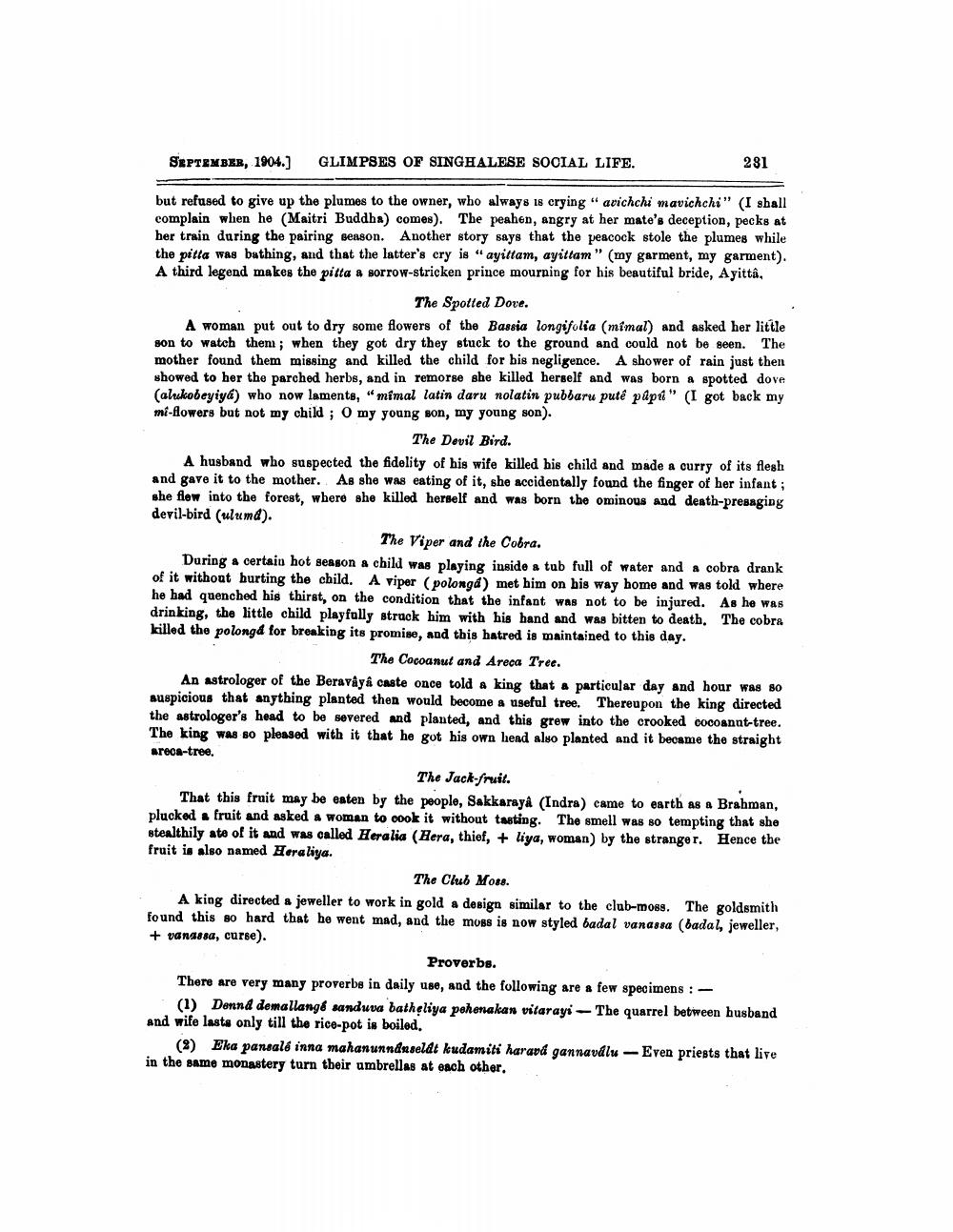________________
SEPTEMBER, 1904.)
GLIMPSES OF SINGHALESE SOCIAL LIFE.
281
but refused to give up the plumes to the owner, who always is crying "avichchi mavichchi" (I shall complain when he (Maitri Buddha) comes). The peahen, angry at her mate's deception, pecks at her train during the pairing season. Another story says that the peacock stole the plumes while the pitta was bathing, and that the latter's cry is "ayittam, ayittam" (my garment, my garment). A third legend makes the pitta & sorrow-stricken prince mourning for his beautiful bride, Ayitta.
The Spotted Dove. A woman put out to dry some flowers of the Bassia longifolia (mimal) and asked her little son to watch them ; when they got dry they stuck to the ground and could not be seen. The mother found them missing and killed the child for his negligence. A shower of rain just then showed to her the parched herbs, and in remorse she killed herself and was born a spotted dove (ahikobeyiyd) who now lamente, "mimal latin daru nolatin pubbaru puté pūput" (I got back my mni-flowers but not my child; O my young son, my young son).
The Devil Bird. A husband who suspected the fidelity of his wife killed his child and made a curry of its flesh and gave it to the mother. As she was eating of it, she accidentally found the finger of her infant; she flow into the forest, where she killed herself and was born the ominous and death-presaging devil-bird (ltemd).
The Viper and the Cobra. During a certain hot season a child was playing inside a tub full of water and a cobra drank of it without hurting the child. A viper (polonga) met him on his way home and was told where he had quenched his thirst, on the condition that the infant was not to be injured. As he was drinking, the little child playfully struck him with his hand and was bitten to death. The cobra killed the polongd for breaking its promise, and this hatred is maintained to this day.
The Coroanut and Areca Tree. An astrologer of the Beravâyâ caste once told a king that a particular day and hour was so suspicious that anything planted then would become a useful tree. Thereupon the king directed the astrologer's head to be severed and planted, and this grew into the crooked cocoannt-tree. The king was so pleased with it that he got his own head also planted and it became the straight Areca-tree.
The Jack-fruit. That this fruit may be eaten by the people, Sakkaraya (Indra) came to earth as a Brahman, plucked fruit and asked a woman to cook it without tasting. The smell was so tempting that she stealthily ate of it and was called Heralia (Hera, thief, + liya, woman) by the stranger. Hence the fruit is also named Heraliya.
The Club Moss. A king directed a jeweller to work in gold a design similar to the club-moss. The goldsmith found this so hard that he went mad, and the muss is now styled badal vanassa (badal, jeweller, + vanassa, curse).
Proverbs. There are very many proverbe in daily use, and the following are a few specimens :
(1) Dennd demallange sanduva bathçliya pekenakan vitarayi - The quarrel between husband and wife lasts only till the rice-pot is boiled,
(2) Eka pansalé inna mahanunndnseldt kudamiti haravá gannavilu - Even priests that live in the same monastery turn their umbrellas at each other.




